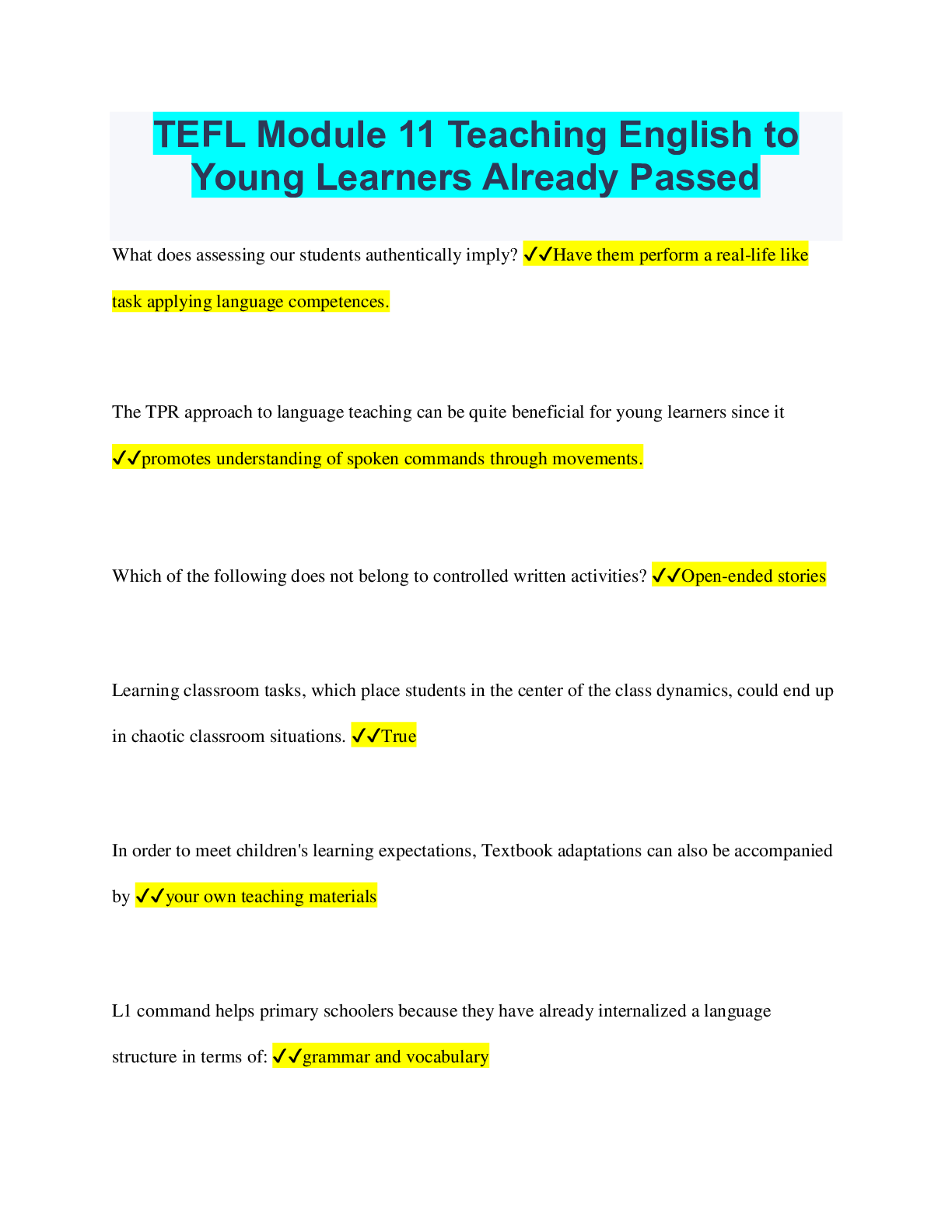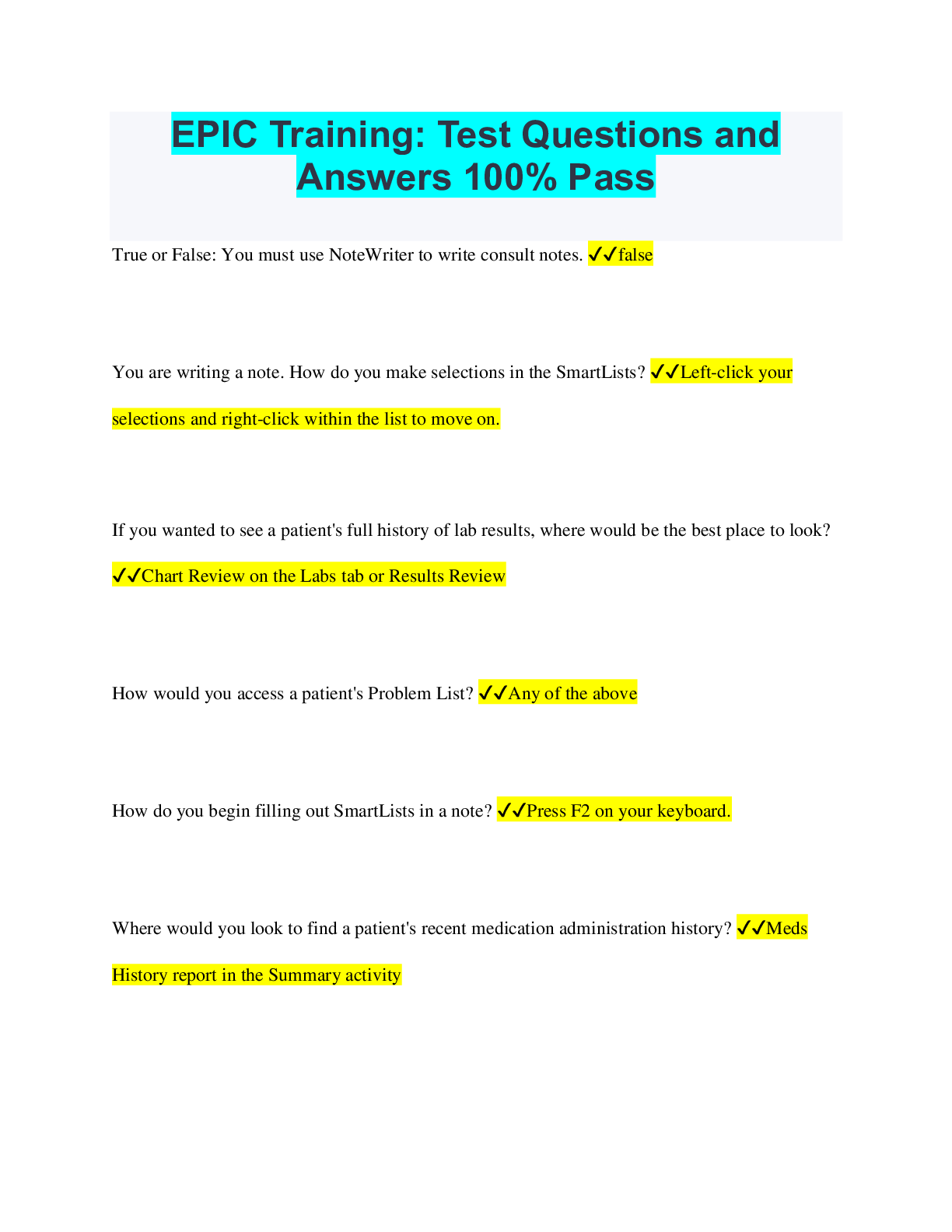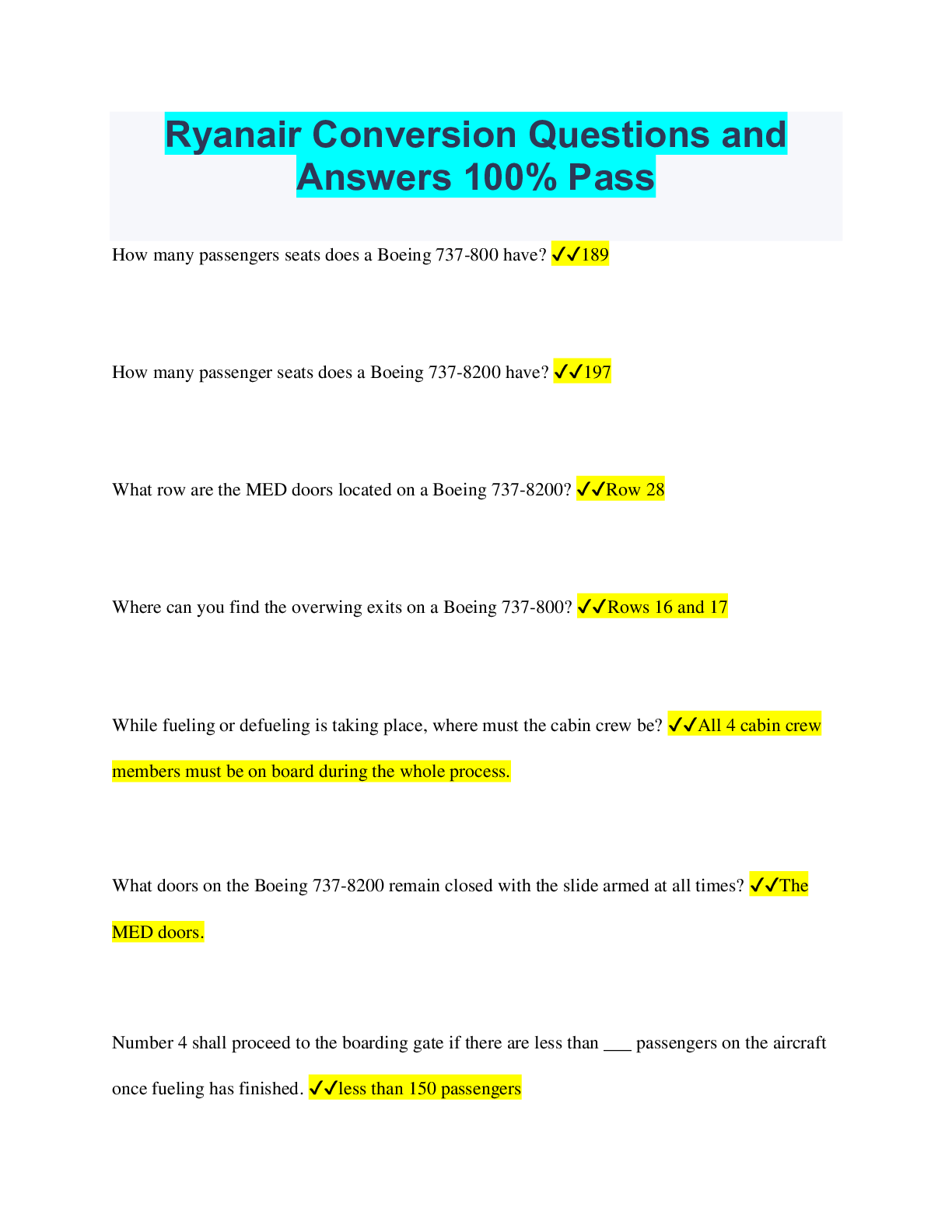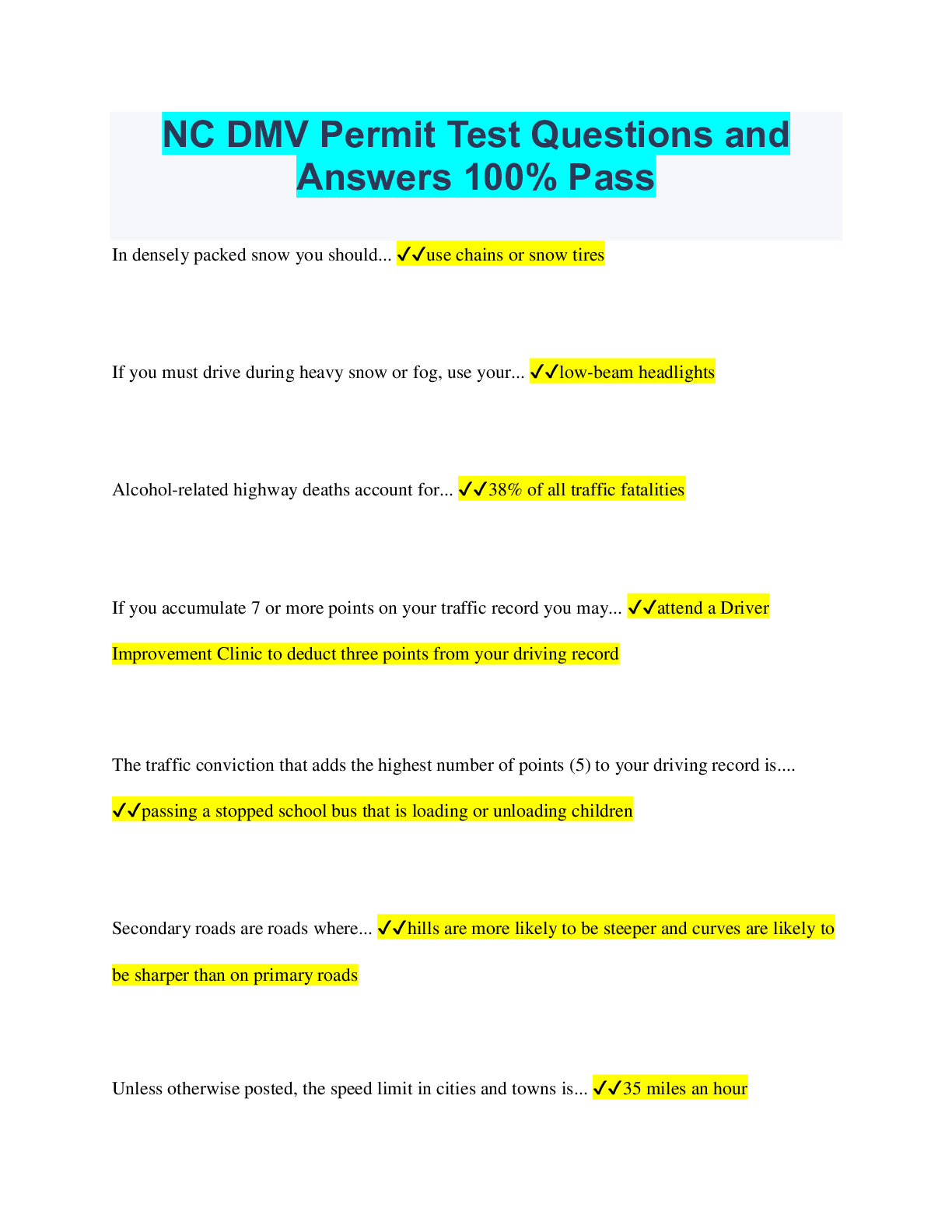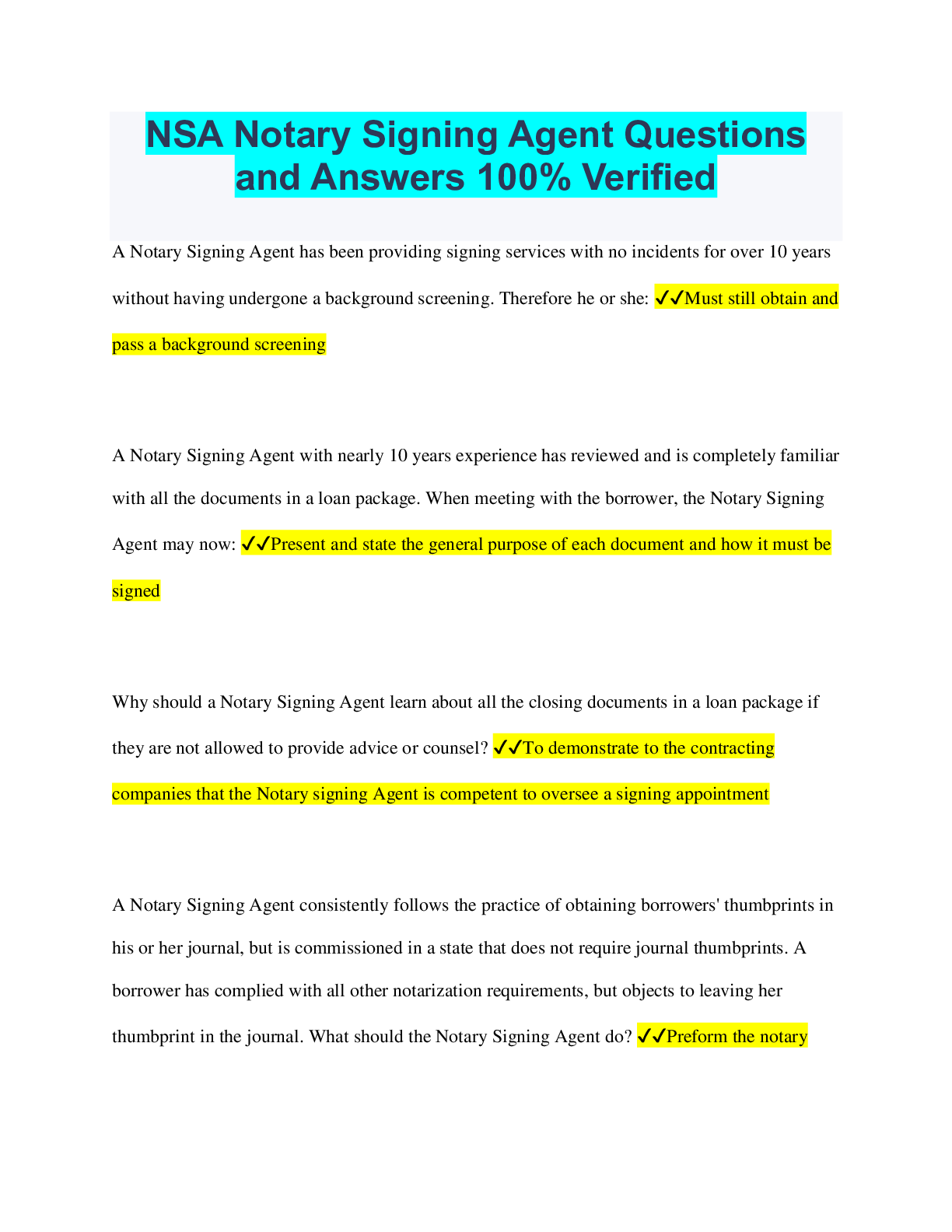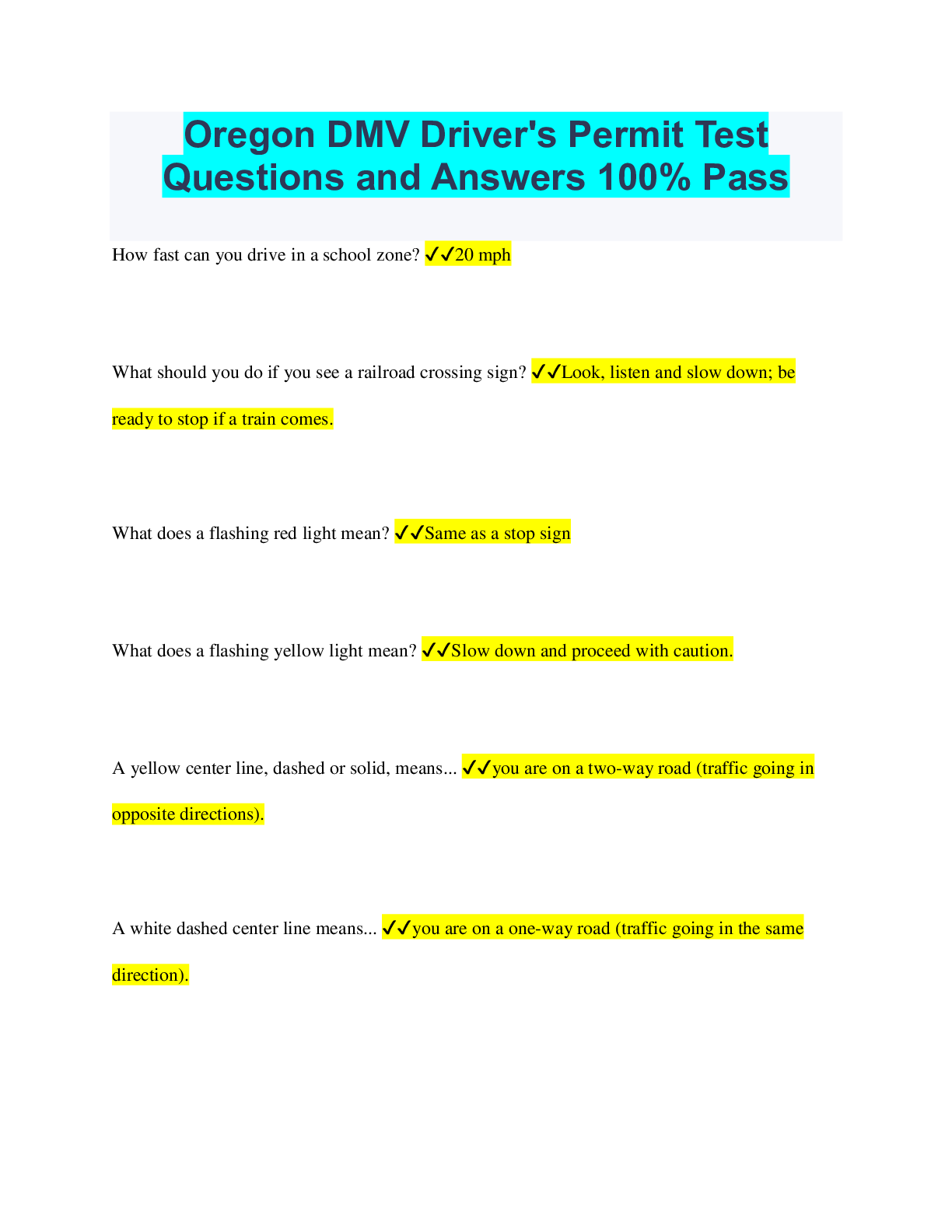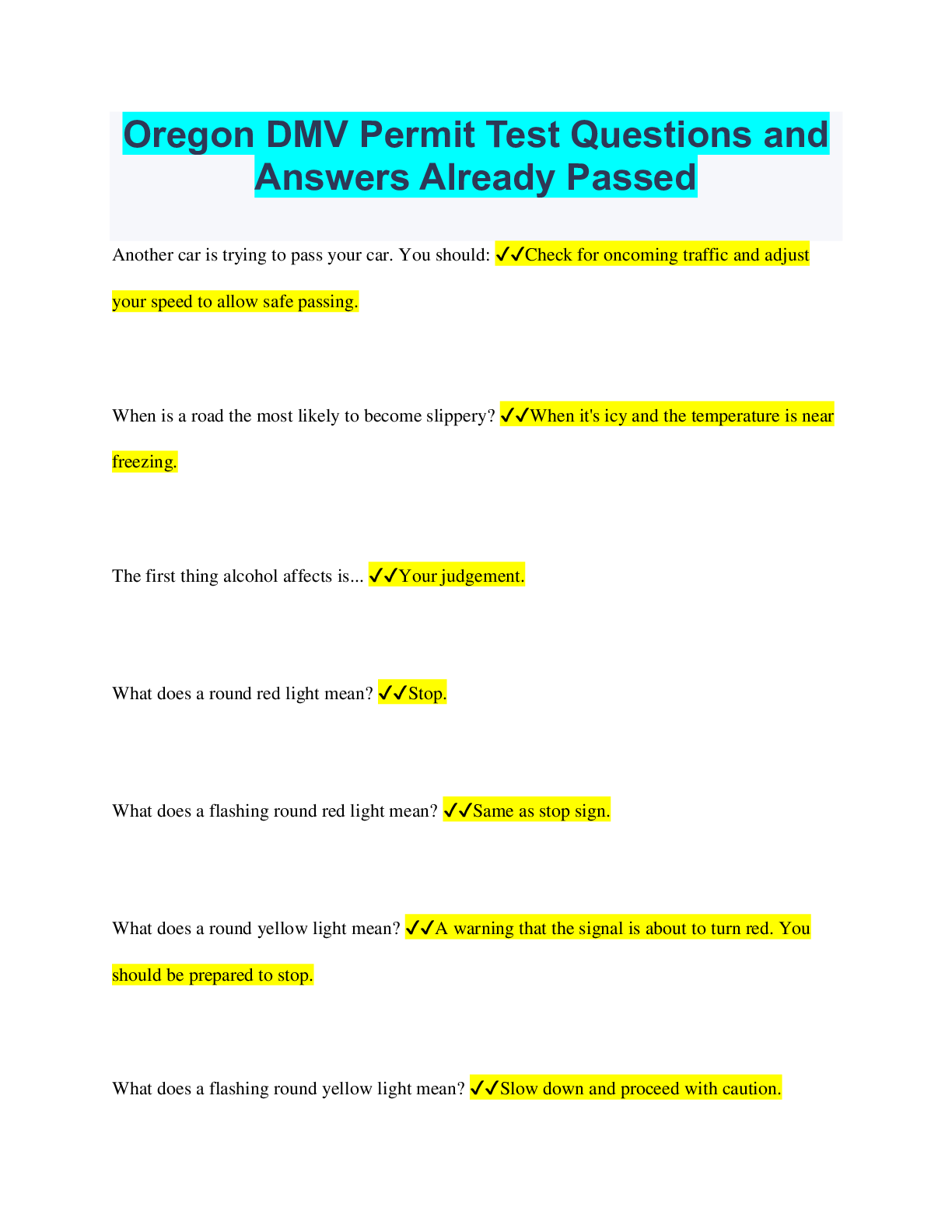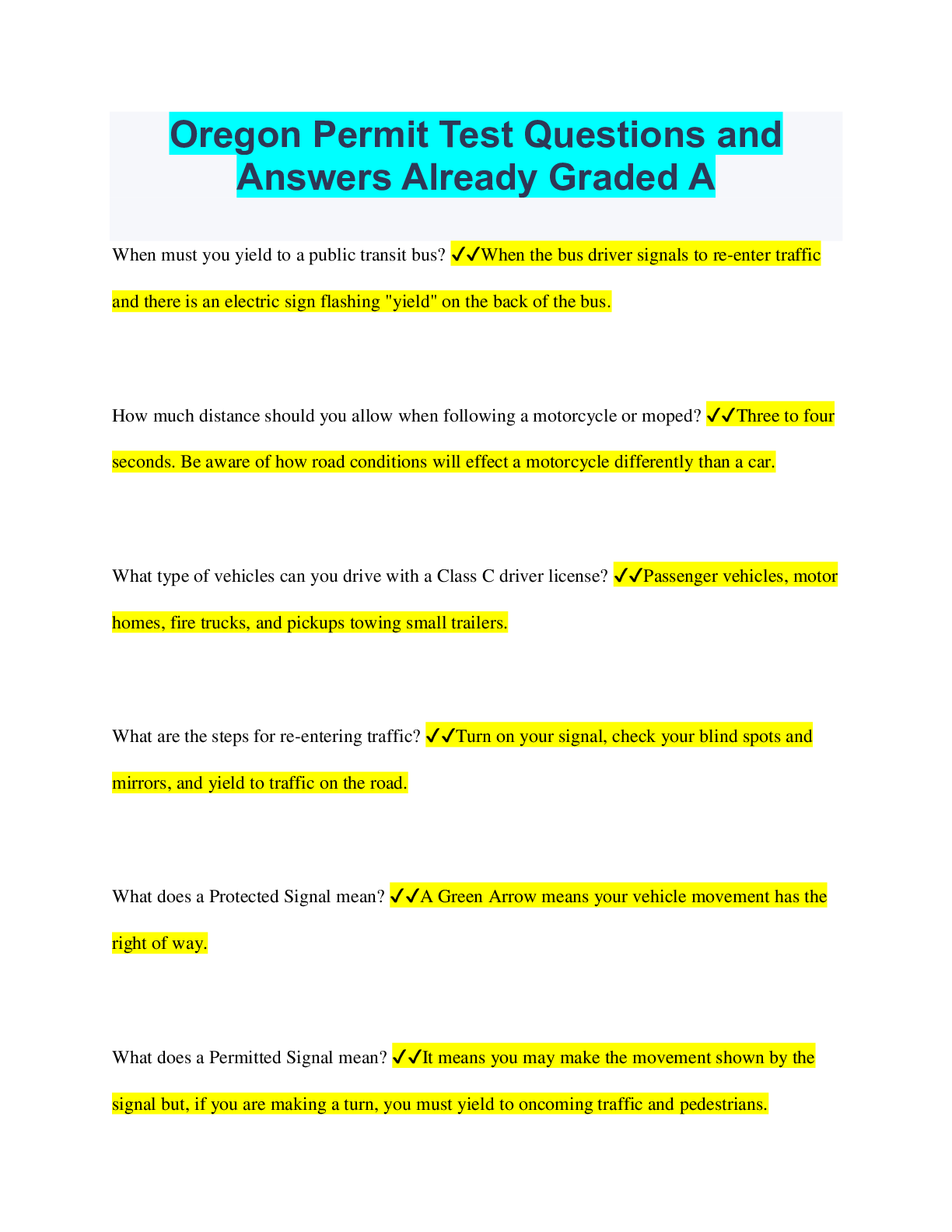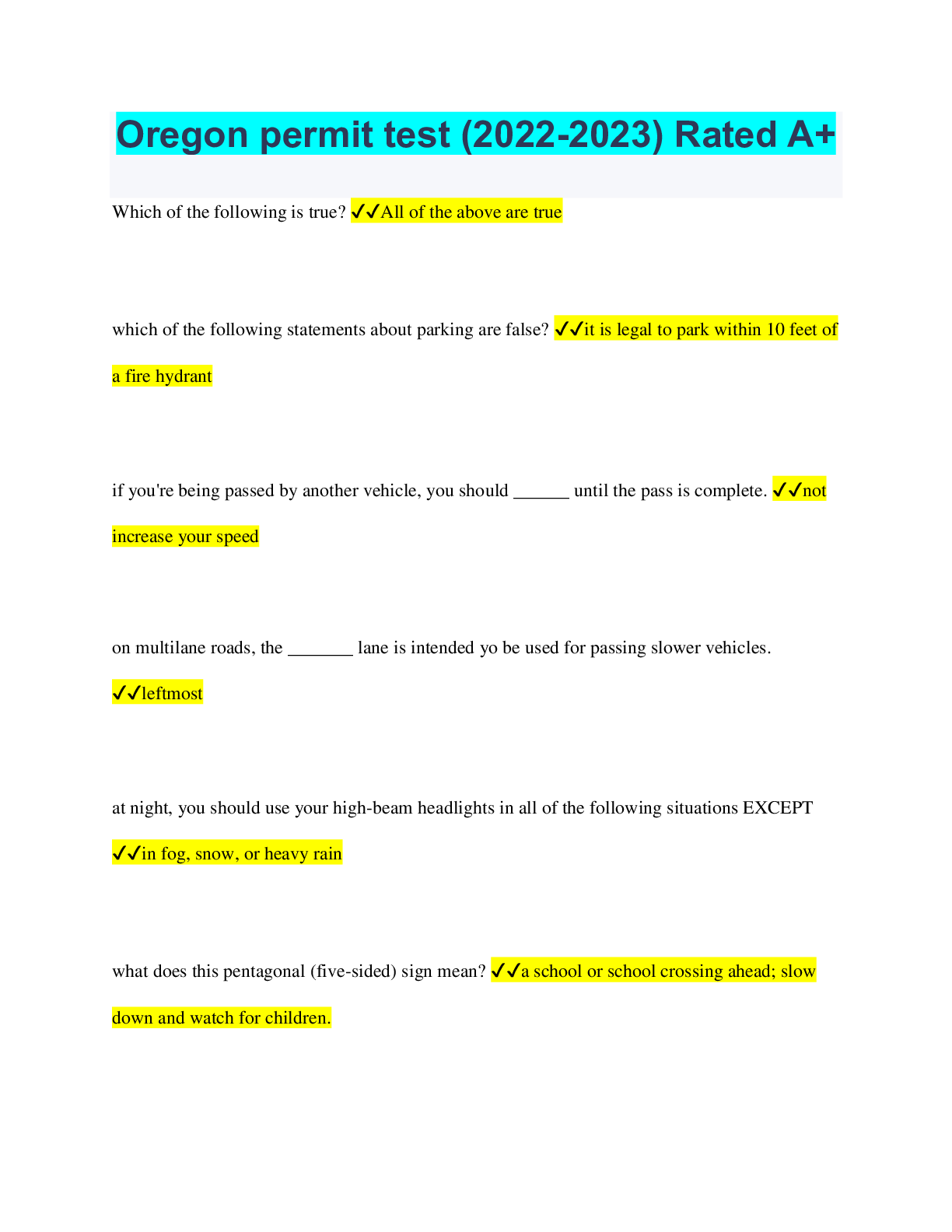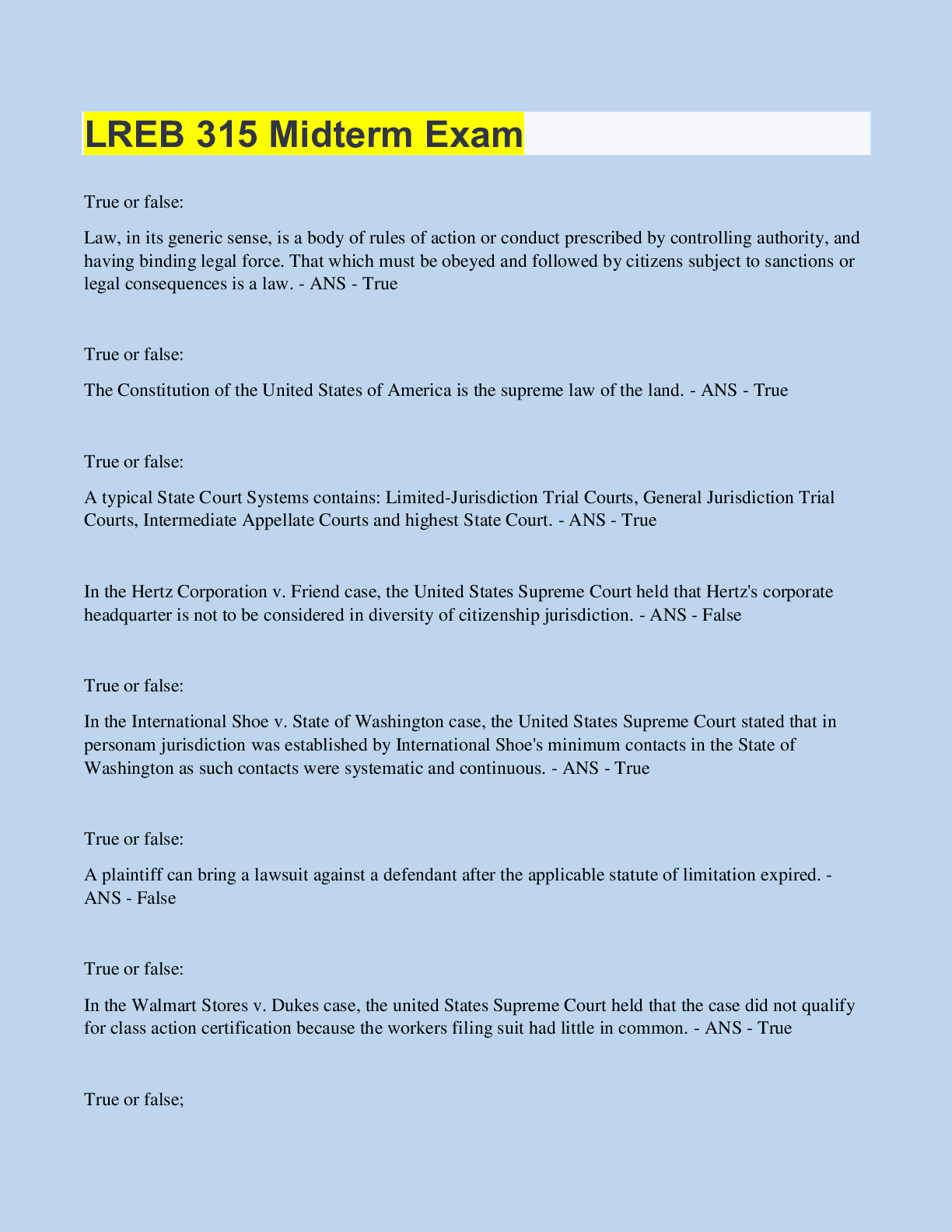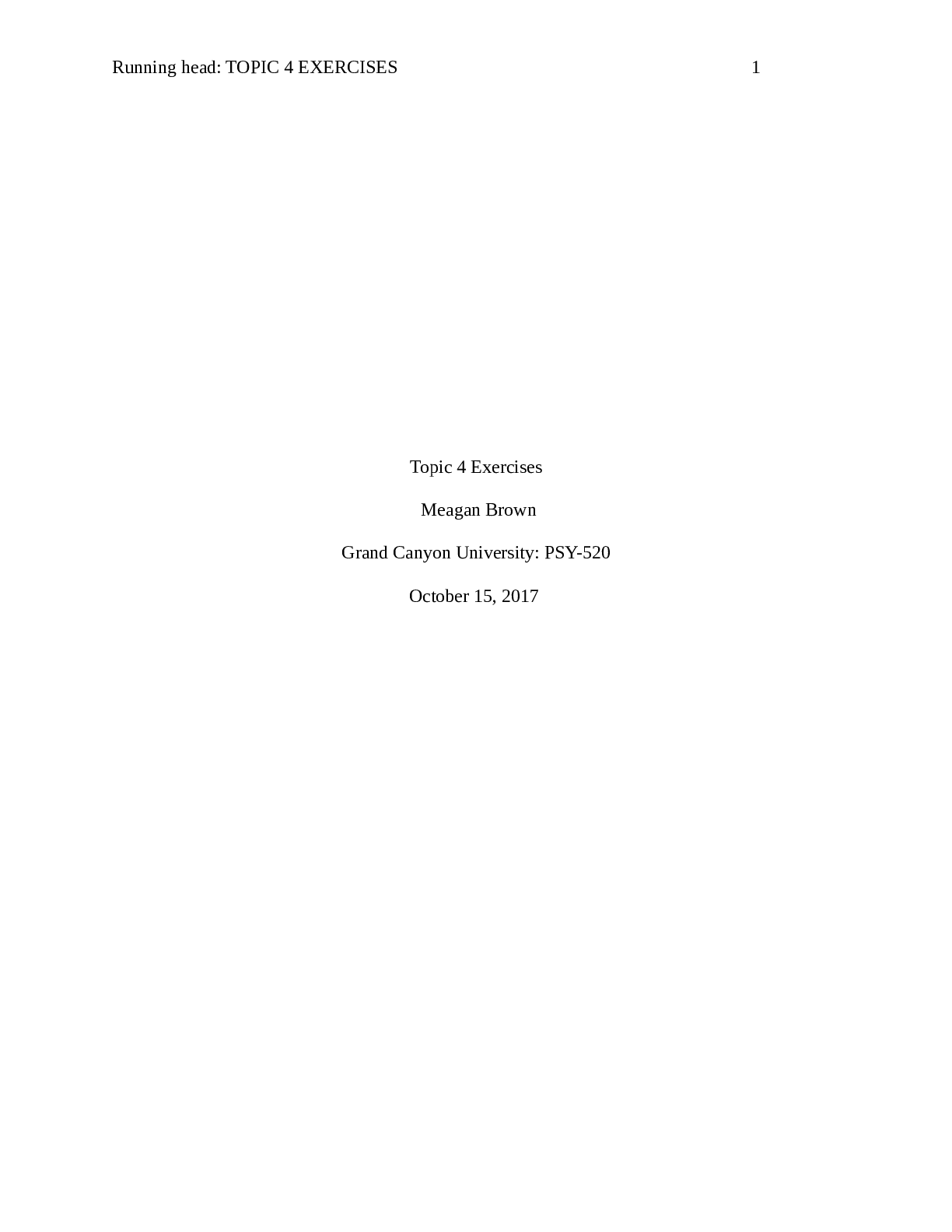Psychology > QUESTIONS & ANSWERS > Grand Canyon University_PSY 520 Topic 5 Exercise:Chapter 13, 14 and 15 COMPLETE SOLUTION(A Plus Work (All)
Grand Canyon University_PSY 520 Topic 5 Exercise:Chapter 13, 14 and 15 COMPLETE SOLUTION(A Plus Work)
Document Content and Description Below
Nicole Birkholz Grand Canyon University PSY-520 6 December 2017 Topic 5 Exercises 13.6 It’s well established, we’ll assume, that lab rats require an average of 32 trials in a complex water m... aze before reaching a learning criterion of three consecutive errorless trials. To determine whether a mildly adverse stimulus has any effect on performance, a sample of seven lab rats were given a mild electrical shock just before each trial. a.) Given that X 5 34.89 and s 5 3.02, test the null hypothesis with t , using the .05 level of signifi cance. Estimated standard error = 3.02/2.646 = 1.1413 t=(34.89-32)/1.1413 = 2.89/1.1413 = 2.532 Df=7-1=6 t critical value=2.447 Since the t value is greater than the t critical value= reject the null hypothesis. b.) Construct a 95 percent confidence interval for the true number of trials required to learn the water maze. 34.89±(2.447)(1.1413) =34.89±2.793 = 32.097 and 37.683 The number of trials would have to be between about 32 and 38 trials. 13.8 Assume that on average, healthy young adults dream 90 minutes each night, as inferred from a number of measures, including rapid eye movement (REM) sleep. An investigator wishes to determine whether drinking coffee just before going to sleep affects the amount of dream time. After drinking a standard amount of coffee, dream time is monitored for each of 28 healthy young adults in a random sample. Results show a sample mean, X, of 88 minutes and a sample standard deviation, s , of 9 minutes. a.) Use t to test the null hypothesis at the .05 level of significance. Estimated standard error= 9/= 9/5.2915= 1.7008 T=(90-88)/1.7008= 2/1.7008= 1.1759 Df=28-1=27; t critical value=2.052 Since the t value is less than the t critical value we do not reject the null hypothesis. This study source was downloaded by 100000831988016 from CourseHero.com on 05-06-2022 04:26:31 GMT -05:00 https://www.coursehero.com/file/27285214/Topic-5-Exercisesdocx/ b.) If appropriate (because the null hypothesis has been rejected), construct a 95 percent confi dence interval and interpret this interval. The null hypothesis was not rejected so there is no need to construct a confidence interval. 13.9 In the gas mileage test described in this chapter, would you prefer a smaller or a larger sample size if you were a.)the car manufacturer? Why? A smaller sample size; to relate to a smaller population there would be less variability due to flaws b.) a vigorous prosecutor for the federal regulatory agency? Why? Larger sample size; the variability can address the flaws with the federal regulatory agency 13.10 Even though the population standard deviation is unknown, an investigator uses z rather than the more appropriate t to test a hypothesis at the .05 level of signifi cance. a.) Is the true level of significance larger or smaller than .05? larger b.)Is the true critical value larger or smaller than that for the critical z ? larger 14.11To test compliance with authority, a classical experiment in social psychol-ogy requires subjects to administer increasingly painful electric shocks to seemingly helpless victims who agonize in an adjacent room.* Each subject earns a score between 0 and 30, depending on the point at which the subject refuses to comply with authority—an investigator, dressed in a white lab coat, who orders the administration of increasingly intense shocks. A score of 0 signifies the subject’s unwillingness to comply at the very outset, and a score of 30 signifi es the subject’s willingness to comply completely with the experimenter’s orders... n1=6 n2=6 ∑x1=56/6=9.33 ∑ x2=42/6=7 SS1=770-(56)2 /6= 770-3136/6= 770-522.67= 247.33 SS2=418-(42)2 /6= 418-1764/6= 418-294= 124 S 2 p= 247.33+124/6+6-2= 371.33/10=37.133 Standard error =3.5182 T= (9.33-7)-0/3.5182 This study source was downloaded by 100000831988016 from CourseHero.com on 05-06-2022 04:26:31 GMT -05:00 https://www.coursehero.com/file/27285214/Topic-5-Exercisesdocx/ = 2.33/3.5182 =0.6623 T= 0.6623 t critical value= 2.228 Since the t value is less than the t critical value you would not reject the null hypothesis. 14.12 To determine whether training in a series of workshops on creative thinking increases IQ scores, a total of 70 students are randomly divided into treatment and control groups of 35 each. After two months of training, the sample mean IQ ( –X1) for the treatment group equals 110, and the sample mean IQ ( –X2) for the control group equals 108. The estimated standard error equals 1.80. a.) Using t , test the null hypothesis at the .01 level of significance. t= (110-108)-0/1.80= 2/1.80 = 1.11 t=1.11 t critical value=2.390 You would not reject the null hypothesis b.) If appropriate (because the null hypothesis has been rejected), estimate the standardized effect size, construct a 99 percent confi dence interval for the true population mean difference, and interpret these estimates. Null hypothesis was not rejected; no need to construct a confidence interval. 4.14 An investigator wishes to determine whether alcohol consumption causes a deterioration in the performance of automobile drivers. Before the driving test, subjects drink a glass of orange juice, which, in the case of the treatment group, is laced with two ounces of vodka. Performance is measured by the number of errors made on a driving simulator. A total of 120 volunteer subjects are randomly assigned, in equal numbers, to the two groups. For subjects in the treatment group, the mean number of errors ( –X1) equals 26.4, and for subjects in the control group, the mean number of errors ( –X2) equals 18.6. The estimated standard error equals 2.4. a.) Use t to test the null hypothesis at the .05 level of signifi cance. t=(26.4-18.6)-0/2.4= 3.25 t critical value =1.671 Since the t value is greater than the t critical value= reject the null hypothesis b.) Specify the p -value for this test result. p<0.001 This study source was downloaded by 100000831988016 from CourseHero.com on 05-06-2022 04:26:31 GMT -05:00 https://www.coursehero.com/file/27285214/Topic-5-Exercisesdocx/ c.) If appropriate, construct a 95 percent confi dence interval for the true population mean difference and interpret this interval. 26.4-18.6±(1.671)(2.4) =7.8±4.0104 =3.8 to 11.8 d.) If the test result is statistically significant, use Cohen’s d to estimate the effect size, given that the standard deviation, s p , equals 13.15. d= 26.4-18.4/13.15= 0.59 e.) State how these test results might be reported in the literature, given s 1 5 13.99 and s 2 5 12.15. Number of errors made on the driving simulator is greater when alcohol is consumed than when no alcohol is consumed. 15.7 An educational psychologist wants to check the claim that regular physical exercise improves academic achievement. To control for academic aptitude, pairs of college students with similar GPAs are randomly assigned to either a treatment group that attends daily exercise classes or a control group. At the end of the experiment, the following GPAs are reported for the seven pairs of participants: (table) a.) Using t , test the null hypothesis at the .01 level of signifi cance. Sample mean of difference scores= ∑D/n= 1.56/7= .22 SSD= ∑D2 - (∑D)2 /n = .48-(1.56)2 /7 = .48-2.4336/7 = .48-.35 = .13 SD= .14 Standard error = sD/ = .14/ = .14/2.646 = .05 t= .22-0/.05= 4.4 t critical value= 3.143 Since the t value of 4.4 is greater than the t critical value 3.143 = the null hypothesis should be rejected This study source was downloaded by 100000831988016 from CourseHero.co [Show More]
Last updated: 2 years ago
Preview 1 out of 7 pages

Buy this document to get the full access instantly
Instant Download Access after purchase
Buy NowInstant download
We Accept:

Reviews( 0 )
$10.00
Can't find what you want? Try our AI powered Search
Document information
Connected school, study & course
About the document
Uploaded On
May 06, 2022
Number of pages
7
Written in
Additional information
This document has been written for:
Uploaded
May 06, 2022
Downloads
1
Views
188


.png)

